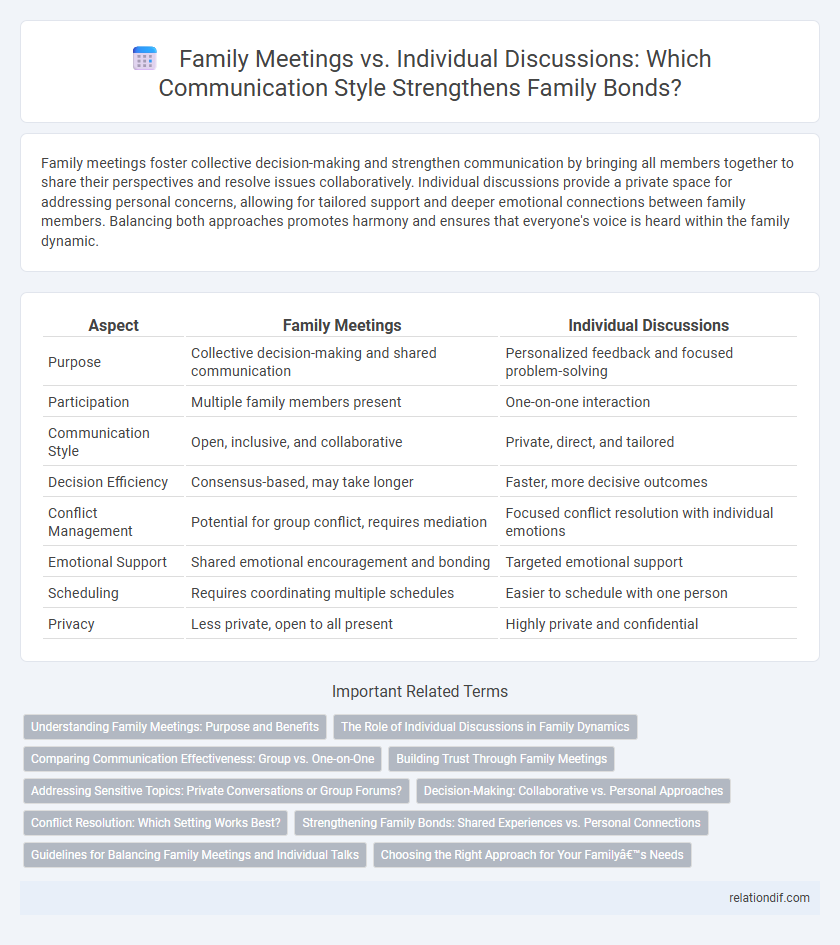Family meetings foster collective decision-making and strengthen communication by bringing all members together to share their perspectives and resolve issues collaboratively. Individual discussions provide a private space for addressing personal concerns, allowing for tailored support and deeper emotional connections between family members. Balancing both approaches promotes harmony and ensures that everyone's voice is heard within the family dynamic.
Table of Comparison
| Aspect | Family Meetings | Individual Discussions |
|---|---|---|
| Purpose | Collective decision-making and shared communication | Personalized feedback and focused problem-solving |
| Participation | Multiple family members present | One-on-one interaction |
| Communication Style | Open, inclusive, and collaborative | Private, direct, and tailored |
| Decision Efficiency | Consensus-based, may take longer | Faster, more decisive outcomes |
| Conflict Management | Potential for group conflict, requires mediation | Focused conflict resolution with individual emotions |
| Emotional Support | Shared emotional encouragement and bonding | Targeted emotional support |
| Scheduling | Requires coordinating multiple schedules | Easier to schedule with one person |
| Privacy | Less private, open to all present | Highly private and confidential |
Understanding Family Meetings: Purpose and Benefits
Family meetings create a structured space for open communication, fostering collective decision-making and strengthening relationships among all members. These gatherings enhance transparency and promote empathy by allowing each person to share perspectives and address concerns together. Unlike individual discussions, family meetings align everyone's goals and values, contributing to a harmonious and supportive home environment.
The Role of Individual Discussions in Family Dynamics
Individual discussions foster deeper emotional understanding and trust within family dynamics by allowing members to express personal feelings and concerns without group pressure. These private conversations often uncover underlying issues that group meetings may overlook, facilitating targeted support and conflict resolution. Emphasizing individual dialogue enhances communication effectiveness and strengthens relational bonds among family members.
Comparing Communication Effectiveness: Group vs. One-on-One
Family meetings foster collaborative decision-making by allowing multiple members to express viewpoints simultaneously, enhancing collective understanding and unity. In contrast, individual discussions enable deeper, personalized communication, facilitating trust and addressing sensitive issues more effectively. Both formats play crucial roles in family dynamics, with group meetings promoting inclusiveness and one-on-one talks providing emotional support.
Building Trust Through Family Meetings
Family meetings create a structured environment where open communication fosters trust, allowing members to express feelings and resolve conflicts collectively. This shared space encourages transparency, strengthening emotional bonds and promoting mutual understanding more effectively than individual discussions. Consistent family meetings establish a reliable platform for collaboration, reinforcing trust and unity within the family unit.
Addressing Sensitive Topics: Private Conversations or Group Forums?
Family meetings provide a structured environment for open dialogue, fostering collective understanding and shared decision-making on sensitive topics such as health or finances. Individual discussions offer privacy, allowing members to express personal feelings or concerns without judgment, which can be crucial for addressing emotional or confidential matters. Choosing between group forums and private conversations depends on the nature of the topic and the comfort level of family members, balancing transparency with respect for personal boundaries.
Decision-Making: Collaborative vs. Personal Approaches
Family meetings foster collaborative decision-making by encouraging open dialogue and collective problem-solving, enhancing mutual understanding among members. Individual discussions allow for personal reflection and tailored responses, supporting decisions that consider individual preferences and emotional states. Balancing both approaches ensures effective family dynamics by integrating diverse perspectives and personal needs into the decision-making process.
Conflict Resolution: Which Setting Works Best?
Family meetings foster collective problem-solving by encouraging open communication and shared responsibility among members, which often leads to more sustainable conflict resolution. Individual discussions provide a private space for addressing sensitive issues, allowing for deeper understanding of personal perspectives and reducing defensiveness. Combining both settings strategically enhances conflict resolution by balancing transparency with personalized attention.
Strengthening Family Bonds: Shared Experiences vs. Personal Connections
Family meetings foster shared experiences that create collective memories and reinforce a sense of unity, promoting long-lasting family bonds. Individual discussions allow for deeper personal connections by addressing unique emotions and concerns, enhancing understanding and trust between members. Balancing both approaches ensures comprehensive relationship-building, blending group cohesion with intimate support.
Guidelines for Balancing Family Meetings and Individual Talks
Establish clear guidelines that allocate specific times for both family meetings and individual discussions to ensure balanced communication. Prioritize open dialogue during family meetings for collective decision-making, while reserving individual talks to address personal concerns and sensitive topics. Encourage active listening in each setting to foster trust and maintain healthy family dynamics.
Choosing the Right Approach for Your Family’s Needs
Family meetings foster collective decision-making and strengthen communication by involving all members in open dialogue, which helps address shared concerns and align goals. Individual discussions offer personalized attention and create a safe space for members to express sensitive issues or personal challenges without group pressure. Selecting the right approach depends on your family's dynamics, the nature of the topic, and the desired outcome, ensuring that communication is effective and relationships remain supportive.
Family meetings vs Individual discussions Infographic

 relationdif.com
relationdif.com